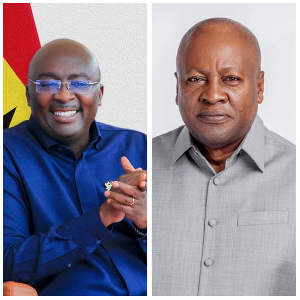
As the 2024 elections draw closer, Ghanaians once again face a crucial decision between two familiar political faces – the National Democratic Congress (NDC) candidate John Dramani Mahama and the New Patriotic Party (NPP) flagbearer Dr. Mahamudu Bawumia. This year's contest is highly anticipated, especially as the tradition of switching governments every eight years remains deeply rooted in the country's political history.
Mahama’s Return: Is He What Ghana Needs Now?
John Mahama, having served as Vice President under the late President Atta Mills and subsequently as President, carries the experience of being both a leader and one who faced a painful electoral defeat. His presidency, from 2012 to 2016, was marred by numerous challenges – the prolonged power crisis (dumsor), corruption allegations, the struggle with public sector employment, and the unpopular cancellation of teacher and trainee allowances. His defeat in 2016 was historic, with the largest margin ever seen in a Ghanaian election, signalling the extent of dissatisfaction among voters.
However, in recent times, Mahama has portrayed himself as a seasoned leader who has learned from his past. His supporters argue that he is the candidate capable of rescuing the country from its current economic woes. The NDC’s strategy has largely focused on capitalising on the perceived failures of the NPP, particularly in the areas of inflation, public debt, and the worsening galamsey menace. They are banking on the electorate’s desire for change, hoping that the sentiment for a switch after two terms of NPP rule will play in their favour.
The big question remains: can Mahama’s leadership deliver the development Ghanaians seek? While his experience is undeniable, voters will have to weigh the gains made under his previous administration and whether the current challenges require a fresh approach or a return to familiar hands.
Bawumia’s Challenge: Can the Economic Architect Rebuild Trust?
On the other side of the political aisle is Vice President Dr. Mahamudu Bawumia, a man who once enjoyed widespread admiration for his economic acumen. Under his leadership, the NPP government launched ambitious projects such as the Free Senior High School policy, digitalisation initiatives like the Ghana Card and mobile money interoperability, as well as promises of industrialisation through the 'One District, One Factory' programme. However, the global impact of the COVID-19 pandemic and the Russia-Ukraine war has significantly eroded the gains made during the first term of the NPP government.
Ghanaians now face high inflation rates, rising fuel prices, and growing public debt, all of which have caused frustration and disappointment. Bawumia, as the Vice President and head of the Economic Management Team, has had his credibility questioned, with the NDC accusing him of failing to live up to his promises of economic transformation. The narrative has shifted from one of economic growth to economic hardship, and Bawumia will need to convince Ghanaians that the challenges the country faces are not entirely of his making.
However, Bawumia has also offered a vision for the future, focusing on continued digitalisation, industrialisation, and economic reforms. He presents himself as the fresh candidate who, despite the difficulties, has the potential to deliver on the long-term promises of the NPP. But can he repair the damage done to his reputation and the economy in time for the elections?
Neutral Ground: What Ghanaians Must Consider
As Ghanaians head to the polls, the choice between Mahama and Bawumia should not be reduced to party loyalty or a simple desire for change. Both candidates carry their own set of strengths and weaknesses. Mahama offers the experience of having led before, while Bawumia brings the promise of continuity with new perspectives and ideas.
The electorate must carefully evaluate the policies each candidate is offering in response to the pressing issues of the day – economic recovery, the fight against galamsey, job creation, and public service reform.
Mahama’s supporters argue that he has learned from his past mistakes and is better equipped to steer the country towards prosperity. Meanwhile, Bawumia’s camp insists that, despite the global economic challenges, the NPP’s policies have laid the foundation for long-term success.
In truth, no single government can solve all of Ghana’s problems overnight. The battle for 2024 is not just about who becomes president but about which path the country believes will lead to sustainable development and a better quality of life. Voters must weigh these options with a focus on pragmatic solutions rather than the allure of rhetoric.
What's your mind? Share your thoughts with us.